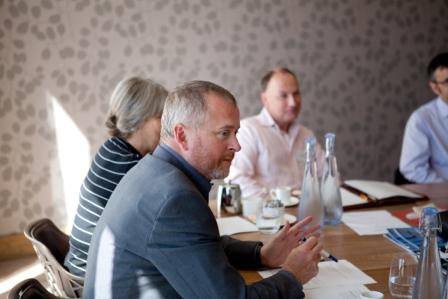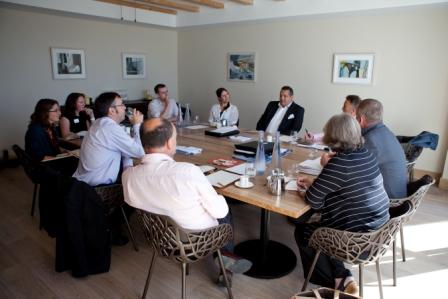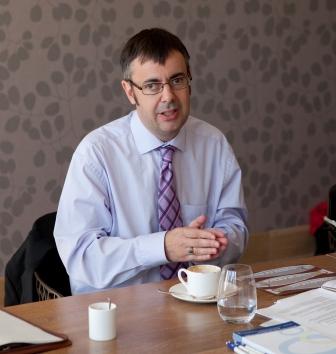Business needs, LEPs, the challenges facing Cornish companies – just some of the subjects that were up for discussion during the Business Lunch, presented at the Scarlet Hotel in association with Peninsula Enterprise
The impressive surroundings of The Scarlet Hotel in Mawgan Porth presented the backdrop for the Business Lunch, which Business Cornwall magazine held last month in collaboration with Peninsula Enterprise, the organisation who delivers the Business Link service in Cornwall, Devon and Somerset.
The Scarlet Hotel was an appropriate venue, as it presented a timely reminder of the levels of quality that Cornwall can achieve.
One of the first topics to be discussed was the unique challenges that the business community faces being in Cornwall. A question of geography or a question of attitude?
Scarlet chairman James Waghorn was first to touch upon recruitment issues he faces in his business.
“There are not enough Cornish people in the job market,” he said. “We’re competing with restaurants in London, and need to make sure we have the staff that can work at that level, but getting them can be quite a challenge.
“We’re happy to grow them once they are here, but it can be difficult to persuade the best to come here in enough volume. Sometimes they are concerned they might come to Cornwall and never get out again.”
Helen Davies started her own clothing business, Eko Sense, last year. And working out of St Just, she could arguably said to be somewhat displaced from her market. However, geography is not an issue. She points to the fact that with modern technology, she could be based anywhere, although “faster internet would be fantastic.”
Instead she draws on the positives of her location. “I find great inspiration from the surroundings and the lifestyle,” she said. “And creativity is very important in my business. We did a photo shoot on Gwithian beech recently.
The aspiration of that image is huge. We used it for a press release to send to the national press and they came back saying how much they loved the image.”
Dr Tim Hamilton is managing director of Scientific Services. Again, technology has enabled him to run his company from Cornwall.
Hamilton is typical of a growing number of people, who left the Duchy, only to return. Hamilton has overcome the issue of geography. “We’ve designed a business that goes out to our customers,” he said.
“While our base is in St Stephen, and that’s where our laboratory is, we have mobile laboratories that go out where the work is.”
When it to comes to trading, however, it is clear there are many advantages to being a Cornish company. Cornwall as a brand has many attributes, and not just for the tourism industry. The vast majority of Cornish Stairways’ business is now overseas, but chairman Mike Jordan is proud of the company’s routes and maintain its strong Cornish identity. “It means something,” he said.
Waghorn agreed. “As a brand, it means something more than Berkshire does, for example, and recognising that fact is important. We desperately tried to call this hotel a Cornish name, but couldn’t find a single one that hadn’t already been done to death by guest houses or was completely unsearchable on Google because ten different people would spell it ten different ways!”
Business services
The role of business support services company like Peninsula Enterprise is many faceted, and against the current uncertain economic backdrop, ever changing.
Adam Chambers, CEO of Peninsula Enterprise which runs the Business Link service in the region, understands the importance of constantly listening and adapting to business needs, and he was presented with plenty of feedback during the debate.
One of the most common enquiries Business Link receives is advice on how to access finance. “Being a start up, money is really tight,” pointed out Mark Grice, MD of business start-up Redfuse Internet.
“But it is not just finance, sometimes the support you get from different organisations can be conflicting, and there can be too much. It can become overwhelming.”
Everyone agreed that finance is worthless without good advice and a plan to back it up. “It’s amazing the number of companies that come forward looking for investment and don’t have a good business plan,” said Thelma Sorensen, chairman of the Cornwall Business Partnership.
For Helen Davies, the most valuable advice comes from business people themselves, who have been there and done it. And she thought business support services should act as a kind of introduction agency.
When she started up Eko Sense, Business Link put her in touch with Lucy Jewson at Frugi, which she found invaluable. “We need more of that linking businesses together,” she said. “I’ve had lots of meetings with advisers, but that meeting with Lucy was fantastic.
“It would be really great for people like us to meet people who have been there done that, connecting us together, have some inspiration and driving force.”
“People in business are the best people to help,” agreed Chambers. “In the early days businesses need a go-to buddy for advice. Someone who knows the company, understands the business and navigate you through the complicated landscape out there.
“The quality of advice is vitally important. I would rather talk to a fellow business person who has won the scars on battle than someone who is remote and distant from me and could be a civil service.
“My organisation has been unfairly criticised in the past for just recycling civil servants, but it’s simply not true. Every adviser in my team is an ex-business person, many of whom have run their own businesses.
“The future of this service has to bring that credibility, otherwise people just won’t use it.”
Going forward, particularly in view of economic constraints, Chambers says Peninsula Enterprise’s focus is on quality rather than quantity.
He said: “Historically we have been able to provide a service for all businesses whatever their ambition, and they have been able to see an adviser. Going forward we will have to cut cloth, and need to focus on businesses that want to grow.
“We would never turn to a business and say we can’t help you, but we will need to be disciplined when looking which businesses to help. There will still be help for them, be it on line or telephone, there just might not be the level of personal touch.
“Historically we have been measured on activity, in the future we will probably be measured in outcomes and I welcome that as a business person. I live and die by achieving outcomes.”
LEPs
With Cornwall Council’s proposal for a Cornwall and Isles of Scilly Local Enterprise Partnership now sitting on Whitehall desks, the debate naturally turned to how the LEP will look in this region, and whether it should look beyond the Tamar.
“We have very strong borders in Cornwall and a strong brand,” said Sorensen. “But we still need strong links across the border to deliver the things we can’t do on own – infrastructure, that sort of thing.”
Waghorn added: “Brand Cornwall doesn’t mean we’re any less part of the south west. But the integrity of what Cornwall means to businesses and consumers is very important and the more we defend that differentiation, the better.”
Chambers agreed that it was important for Cornwall to collaborate with neighbours when appropriate. “There are Cornish issues just for Cornwall, but at times it is important that Cornwall works with other to punch its weight. How can we get that foreign direct investment, for example? Can we do it as Cornwall, or should we bulk up as a peninsula, which I think is the right sort of scale to maximise the benefit. We’ve got to be savvy as a county of playing the game at the right level.”
Much of the wider LEP debate centres on the levels of private sector involvement, that Government minister Eric Pickles has called for.
Jordan: “We have our strengths and must recognise that and work hard behind the unitary authority to achieve things. And it must be led by the private sector, a consortium of well-recognised business people who keep it on track. The private sector will be the kiss of death to it. Yes, we need something to ensure lines are open to Whitehall, but shouldn’t the MPs be doing that for us? They should earn their money.”
Jordan concedes that in Cornwall, the private sector cannot drive the economy and that the only real money is with the Council. And says the time is now for chief executive Kevin Lavery to justify his salary.
“I am a supporter of Kevin Lavery if he makes it work,” he said. “But if I had my way, Lavery would not attend any council meetings, he would leave that to his deputy. He is here to take on board all the various views, reports and studies, and make it happen. He should never sit on a council meeting, trudging through the agendas. We don’t have the luxury of time anymore.”
Chambers backed the importance of private sector involvement. He said: “It is important for business to lead it for its own priorities,” said Chambers. “If, for example, you have £20 million worth of projects you would like to seem but only £10 million to spend, you have to prioritise to make sure that money is spent wisely, and you need business to do that. Business people are always making those decisions.”
And Sorensen had this advice: “The public sector will want a strong role in it, but we must make sure we have the right level of private sector engagement. And the private sector must present a united front and not fight among themselves.”
must be geared more to smaller businesses in Cornwall. And where the Council is in competition with the private sector, it should step back because public sector bodies can seriously undermine private sector activity.”
Tourism
Tourism is the largest contributing sector to Cornwall’s GDP, but amidst all the talk of knowledge economy and environmental technology, can sometimes be lost in the greater economic debate. A point James Waghorn was keen to raise at the debate.
“Am I right in thinking,” he asked, “that there has been a discrimination against tourism? This hotel cost more to build than it is worth on paper, naturally enough. But gap funding, can’t get it, it was instantly closed to us. People have said this is a classic example of when investment in sustainable technology is absolutely worth the public finding, but time again tourism seen as ice cream on the beach and shouldn’t be funded because it is low value added all it brings in is gap year students etc.”
Sorensen explained: “Europe regulates which sectors money can go to. If this hotel had been Gap funded, other hotels in Newquay would ask why have they been given a competitive advantage?”
Waghorn went on to say that confusion can sometimes be created when pigeon holing all tourism together, to the detriment of the high quality projects, like the Scarlet. “In reality,” he said, “the Scarlet is about inward investment. People who stay here might start a business in Cornwall. They come here, enjoy the environment and think this is the sort of place I want to be involved with.”
Chambers reassured Waghorn that he believed the Council very much values tourism, but conceded the dangers of labelling businesses and categorising them into specific sectors. “I don’t think entrepreneurs wake up and say I’m going to start a business in the food and drink sector,” he said.
“They say, ‘I’ve got a brilliant idea, I’m going to do it. “A sophisticated approach to business support is sector blind, it just looks at where things are winners, potentially, and that return on investment.”
Going it alone?
In these tough economic times, you could be forgiven for thinking that now is not the best time to start your own business. But the delegates were unanimous in insisting that if you have a good business idea, you should not let the economy delay things. And with pressure on the jobs market, particularly in the public sector, there is likely to be stark upturn in business start-ups in Cornwall.
“Go for it,” advised Mark Grice. “I was in well paid job with an agency in Cornwall, but couldn’t really go any further than I was. So the choice was do I leave Cornwall or go on my own, I went on my own and it’s paid off. If it all fails now I haven’t lost anything, I’ve given it a go.
Dr Tim Hamilton added: “If you have a good idea take time to reflect, sit down and plan where you are going to be in the next few years and go and speak to people like Business Link.
“Take the advice, sift through the advice and push it forward and don’t be too under ambitious. Be over ambitious and you will probably get half way there.”
Peninsula Enterprise develops and delivers a range of enterprise services to help South West SMEs start up and grow. These include Business Link, Business Growth Services, Skills, Rural and Environmental support, UK Trade & Investment and Envirowise in Scotland and Wales.







![Peninsula Logo[1]](https://businesscornwall.co.uk/wp-content/uploads/2010/10/Peninsula-Logo1.jpg)







In a county where 50,000 of the 234,000 aged 16 – 65 are self employed (Source ONS), it shows how dependant our county is on micro businesses. This is a strength and a testament to the innovative and independant natured people of Cornwall, who have turned to self employment and setting up in business when faced with the massive job losses from the demise of large private sector employers over the past decade in the county.
In order to deliver economic improvement in the county, the LEP repesenting us needs firstly to address and support the changing needs of the SME sector. If it delivers on that effectively, everyone will benefit.
What can be achieved with the private and public sector working in partnership is phenomally more than what can be achieved by either working effectively in isolation. If the LEP is allowed to evolve as a rebrand of what is currently in place, it will not achieve the economic benefit that we all desire.
I can fully understand how difficult it must be for the public sector to promote a rebalance of the economy towards the private sector when they are facing such deep cuts themselves. They need to take a leap of faith for us all to benefit – Can they take that leap? Time will tell.
Did Mike Jordan really concede that “in Cornwall, the private sector cannot drive the economy and that the only real money is with the Council”? That would seem uncharacteristic…
The only *real* money is that generated by the private sector, and in particular businesses ‘exporting’ across the Tamar and internationally. The Council and the rest of the public sector are funded by the employee taxes, Corporation Tax and business rates we pay.
Looked at in terms of “Cornwall PLC”, the Council is back-office overhead! Necessary, of course, but not to be mistaken for the real profit-generating operations.
Comments are closed.